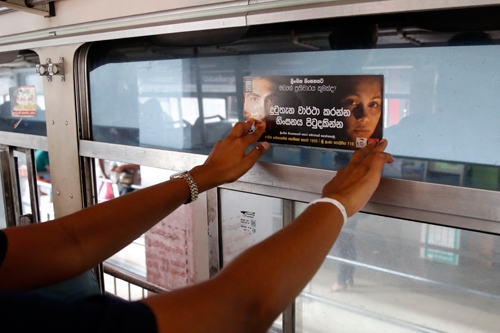Taking to bus stands to drive home the message of sexual harassment

Spreading awareness: A sticker being placed on a bus. Pix by M.A. Pushpa Kumara
Amidst the hustle of Colombo on a Monday morning with passengers rushing to work and on their daily chores, a group of volunteers gathered for a worthy cause at four main bus stands.
Their mission was to raise awareness on some burning social issues that bus travellers face: gender- based violence and sexual harassment on public transport. The enthusiastic volunteers conducting this one-day sticker and leaflet campaign were from the John Keells Foundation (JKF), the campaign now in its third year.
The campaign on November 26 was to coincide with the International Day for the Elimination of Violence against Women which fell on the previous day.
This year’s campaign targeted bus commuters within the Colombo city limits, focusing on the importance of reporting incidents of sexual harassment and abuse and to create awareness and prevent such incidents happening.
JKF staff volunteers were seen distributing leaflets at SLTB Pettah Central bus stand, Bastian Mawatha private bus stand, Gunasinghepura private bus stand and the Borella bus stand throughout the day.

Michelle Perera
Aptly themed ‘See it, Report it,Prevent it,’ the campaign distributed approximately 28,000 information cards in Sinhala and Tamil among the commuters reaching over 100,000 people. Around 1,500 stickers were pasted on buses with the active support of over 75 JKF volunteers representing all departments.
At the Pettah Central bus stand, we met volunteer Michelle Perera employed at JKF Walkers Tours. “This is a great opportunity to talk to people about incidents of violence happening around us,” Michelle said. According to her, bus drivers and conductors approached the JKF volunteer team with various other problems of infrastructure facilities at the bus stand.
“Some people appreciated what we were doing and they actually stopped and bothered to ask what it was all about,” Michelle noted.
Sujith Mangala attached to JKF Transportation was happy to be a part of the campaign as a first-time volunteer. “Sexual harassment in public transport is a known fact in Sri Lanka and awareness should be raised around the issue,” he said

Susith Dewaraja
Both stickers and leaflets carried information on the 24-hour police hotline 119/ 0112444444 and National Transport Commission hotline 1955 open to victims and witnesses of sexual harassment incidents. Sexual harassment is a punishable offence under the Penal Code of Sri Lanka.
The information cards also introduced the personal safety ‘2six4’ mobile app which enables immediate reporting of incidents of gender-based violence. The app was developed by Women In Need (WIN) with the aim of ensuring the safety and protection of women and girls in the country. The venture is supported by the Sri Lanka Transport Board and the Western Province Provincial Road Passenger Transport Authority.
“We try to create a dialogue not only around violence against women but also on gender-based violence, harassments happening to boys and men,” said young volunteer Susith Dewaraja, a Management Trainee at JKF. As the focus falls on reporting cases of abuse to relevant authorities, Susitha believes that irrespective of commuters’ positive or negative concerns, each leaflet distributed and each sticker pasted is a step in the right direction.

Shihara Gunasekara
The public transport campaign was carried out as a venture of John Keells Foundation’s Project ‘WAVE’ (Working Against Violence Through Education) founded in 2014. Project ‘WAVE’ is an ongoing long-term initiative on preventing gender- based violence and child abuse through education and awareness.
Shihara Gunasekara of the JKF Legal Division was distributing leaflets at Bastian Mawatha private bus stand with her team members. “After we pointed out the emergency hotlines on the card, some women actually put the cards inside their handbags,” Shihara said.
Hitesha Tharangani, from Kalpitiya, one of the bus commuters waiting for her ride spoke of the uncomfortable incidents she had faced while travelling by bus. “I would always take immediate action against physical harassment happening in public transport, but there are women who keep quiet, too afraid to speak up,” she said, reflecting a common problem many women suffer.


